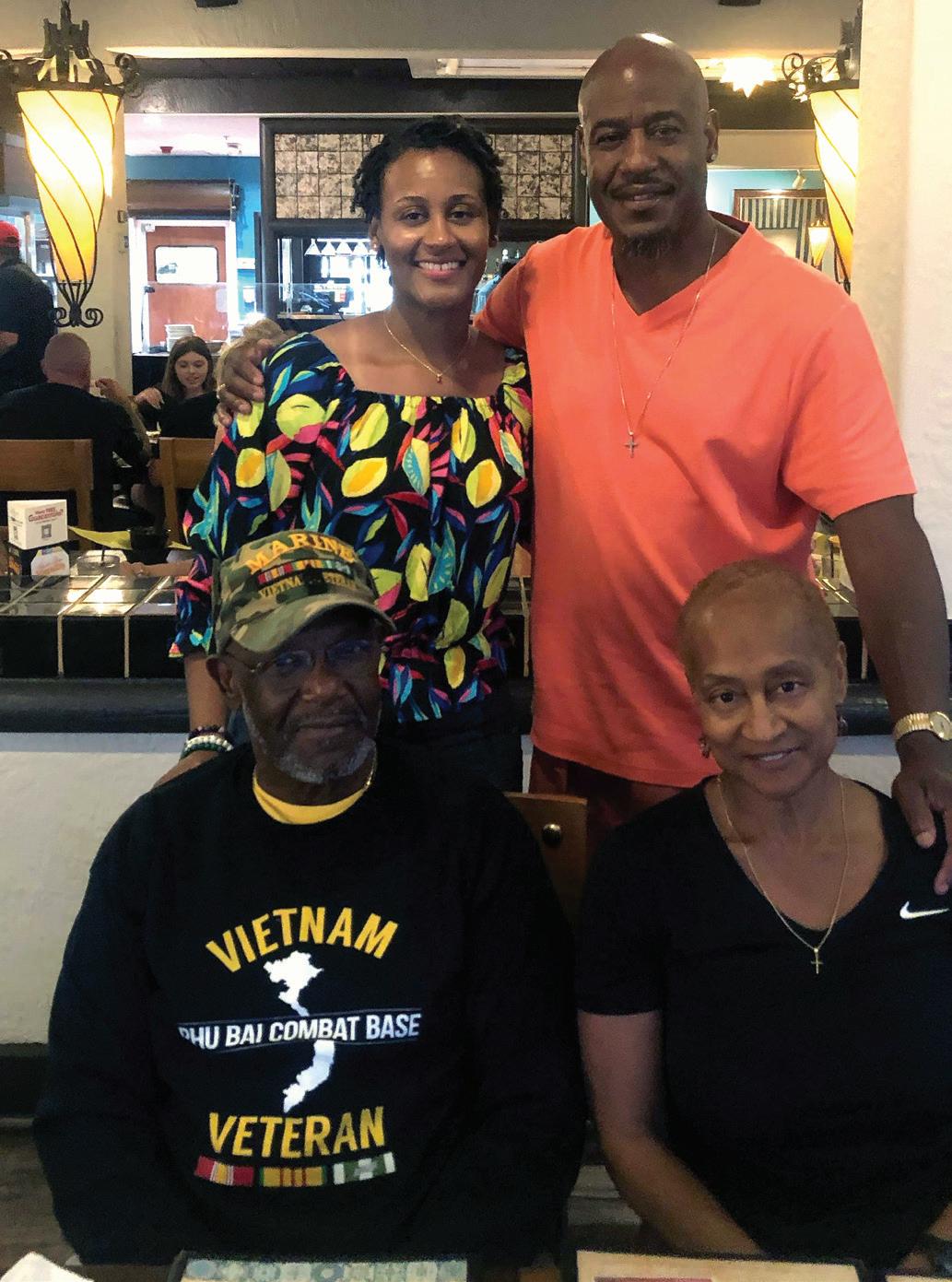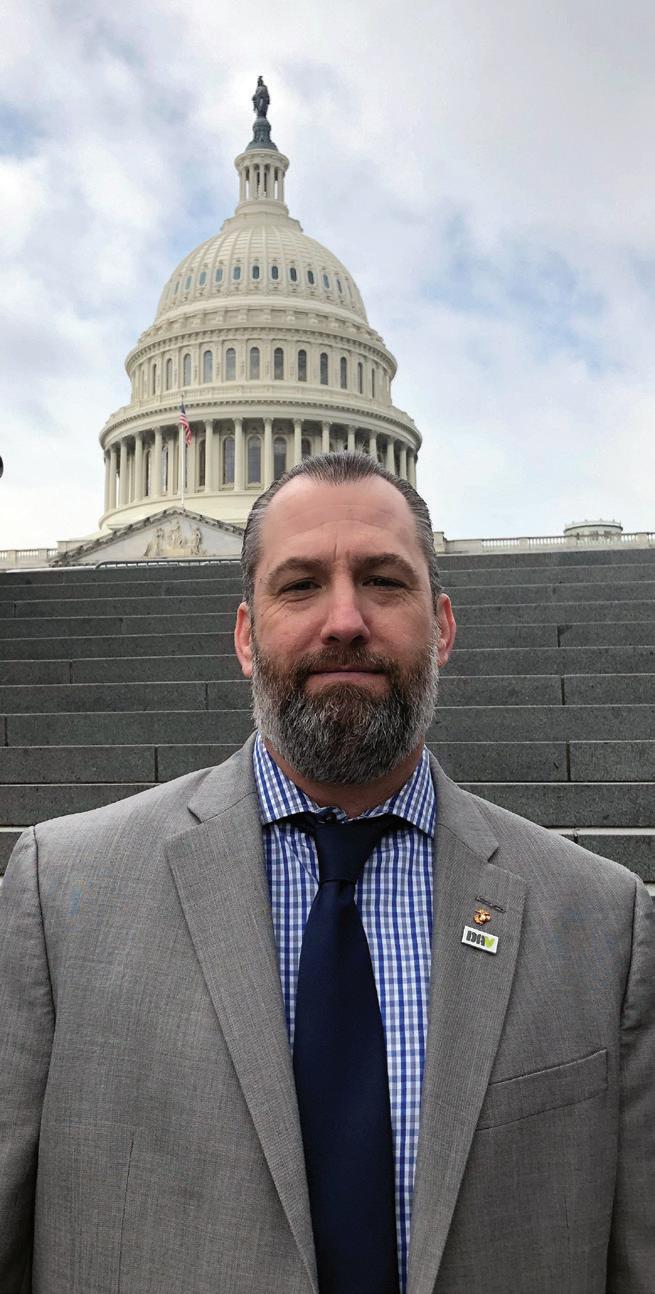
8 minute read
PACT Act opens up additional benefits for Vietnam veteran
DAV benefits advocate helps Vietnam veterans’ disability claim thanks to the PACT Act
By Kevin C. Miller
Growing up in Denver, Alfred “Al” Lewis Jr. had never considered joining the military even though he lived near an air force base. But after falling in with the wrong crowd and being expelled from high school, Lewis knew he needed a fresh start. Despite the country being at war in Vietnam in 1960, the 17-year-old enlisted in the Marine Corps.
He trained in chemical, biological, radiological and nuclear defense and deployed to Phu Bai Combat Base just south of Huế, Vietnam, in 1966. During his deployment, his primary duty was to stand guard at the air base and work in supply.
“I remember watching our planes spray a substance around the base to clear out the jungle,” Lewis explained. “We would end up walking through the substance while on duty at various points of the deployment and thought nothing of it at the time. It wasn’t until years later that we learned that it was Agent Orange and the impact it had on our health.”
During one of Lewis’ guard shifts, a mortar and rocket attack knocked him over and blew out his hearing, requiring him to be medevaced to Japan for evaluation and recovery.
The hearing loss affected him greatly, but otherwise he was healthy enough to continue serving. Lewis deployed for his second tour to Vietnam in 1970 and eventually retired as a master sergeant in 1981.

Upon retirement, Lewis filed a Department of Veterans Affairs disability claim independently and received compensation for hearing loss in one ear and injuries to his knee and back. He also returned to school, got bachelor’s and master’s degrees in accounting, and started a career as an auditor for the Naval Audit Service and Air Force Audit Agency.
In 2012, Lewis retired from his career as an auditor. Less than a year later, he had a heart attack and received treatment at the Loma Linda VA Medical Center. During his recovery, a friend from church who happened to be an Air Force veteran told Lewis he should contact DAV to review his disability claim.
Lewis reached out to a DAV benefits advocate in Los Angeles who worked with him to establish that his heart condition was service-connected due to Agent Orange exposure. The VA awarded Lewis a disability for his heart but denied his claim for hypertension since it was not a presumptive condition at the time of filing.
“I was so thankful to DAV for representing me and advising me on the benefits I qualified for,” said Lewis. “I thought I could file my disability claim by myself, but I was unaware of all the conditions related to Agent Orange exposure. I wish I had DAV representation when I first filed my claim.”
After getting his disability compensation upgraded, Lewis decided to become a lifetime member of DAV and stayed in touch with the local benefits advocate to see if they could get his hypertension serviceconnected. In fall 2022, Adam Barnes, the national service office supervisor in Los Angeles, talked to Lewis about the new presumptive conditions related to toxic exposures that qualified for benefits under the Honoring our PACT Act.
Barnes informed Lewis that, thanks largely to DAV’s legislative advocacy, hypertension was now a presumptive condition. Barnes helped him file a new claim, and in early 2023, Lewis got word that he would finally get the benefits he earned for that condition.

“Lewis had fought for many years to get all the benefits he deserved,” said Barnes. “It was great to inform him of the changes to the law and get him the rating that accurately reflects all the conditions that have impacted his life and overall health.”
“Lewis’ story is a great example of how professional representation makes a difference in veterans’ lives,” said DAV National Service Director Jim Marszalek. “Our benefits advocates are experts in providing the latest information on veterans benefits, including the most recent updates from the PACT Act, and they know how to get positive results.”

Independence Day
Independence Day is annually celebrated on July 4 and is often known as “the Fourth of July”.

It is the anniversary of the publication of the declaration of independence from Great Britain in 1776. Patriotic displays and family events are organized throughout the United States.
On July 4th, 1776 the United States laid down its claim to be a free and independent nation by adopting the Declaration of Independence. Today, Independence Day is celebrated and honored in many forms such as fireworks, BBQs and parades. It is an opportunity for Americans to express patriotism and love of country including reflecting on the sacrifices from those in the military.
Independence Day History
On June 11th, 1776 the Second Continental Congress met in Philadelphia to formally sever ties with Great Britain. Thomas Jefferson, who considered an esteemed writer, was selected to draft the document. After 86 revisions and on July 4th, 1776 the Continental Congress signed the final version.
The first readings of the document included ringing of bells and band music. The following Fourth of July Congress was adjourned in Philadelphia and everybody celebrated with bells, bonfires and fireworks. Soon these customs spread to other areas within the 13 colonies and new customs began to develop such as picnics, speeches, games, military displays and of course fireworks. These traditions continued for almost a century before Congress finally established Independence Day as a holiday.
Thomas Jefferson was the principal author of the Declaration of Independence. The Declaration states, “We hold these Truths to be self-evident, that all Men are created equal, that they are endowed by their Creator with certain unalienable Rights, that among these are Life, Liberty, and the Pursuit of Happiness….”
Independence Day Facts
• The original copy of the Declaration is housed in the National Archives in Washington, D.C. and July 4 has been designated a national holiday to commemorate the day the United States
• Independence Day 2015 is the 239th Independence Day.
• 56 People signed the Declaration of Independence.
• John Hancock was the first signer and famously had the largest signature.
• In July 1776 there were an estimated 2.5 million people living in the Colonial United States.
• Currently there are approximately 316 million Americans.
• The Declaration of Independence was revised 86 times.
• The first Independence Day was celebrated on July 8, 1776.
• Thomas Jefferson and John Adams both died on the Fourth of July, 1826.
Things to do on the Fourth of July
• Barbecue with friends and family
• Watch a fireworks show
• Go to a blockbuster movie release
• Have a block party
• Light some fireworks (safely & legally of course)
• Attend a baseball game
• Find water – Boating, beaching and water skiing
• Rent a 4th of July themed movie
• Find a National Park hosting a July 4th event
Patriotic Things to do on the Fourth of July
• Fly the American Flag
• Wear Red, White and Blue
• Volunteer to help our veterans
• Take a trip to a special fort, park or monument near you.
• Go to a Fourth of July celebration
• Attend a Revolutionary War reenactment
• Send Letters, Care Packages, and Other Ways to Support the Military
Make July your Month of Independence

In the United States we have just finished celebrating the 4th of July. It’s a special time to Americans. Not only are there picnics and parades, there is an understanding that over 200 years ago people got fed up with the way things were and pledged their “lives, fortunes, and sacred honor” to making the changes they saw necessary for long-term success as a nation.

July is also halfway through the calendar year, six months away from the hopeful exuberance of New Year’s resolutions. This makes it a perfect opportunity to make July a month to declare your personal independence from the things that are standing in the way of your resolutions and goals. Revisit those grand dreams and declare your independence from the tyranny holding you back – pledging with the same revolutionary fervor as the patriots did to make the changes necessary for your success.
Declare your independence from failure.
How are you doing on the goals you made at the first of the year? Have you fallen so far behind that you have shoved them back into a corner, pointedly ignoring them because you feel that you have failed?
This is the tyranny of failure. It stalks along beside you, assuring you that each and every time you try something new it will not work out and you will not be successful. Often it has helpers – your friends, coworkers, possibly even those closest to you. Regardless, the largest ally of failure is the voice inside of you.

Before you listen to all these voices, ask yourself these three questions:
• Have you given this goal your best effort?
• If you have – what are the reasons you could not be successful? Is it a lack of resources, knowledge or skill?
• How can you learn from where you are and make a plan to acquire what is missing – the resources, knowledge or skills – to allow you to be successful?
The great Roman general Marcus Aurelius asked the question a different way: “Does what’s happened keep you from acting with justice, generosity, self-control, sanity, prudence, honesty, humility, straightforwardness?”
In other words, does what you perceive as failure change your basic nature as a human being? If not, don’t waste time being held back by the failure. Instead use it as an opportunity to learn and grow. Take that learning and growth into the future and continue on to achieve your goals.
Declare your independence from fear.
Television personality Mike Rowe tells a story when he stood before the camera to begin his first night as a host on the shopping channel QVC. He had a product he knew nothing about, he had no experience in live television, and he knew that QVC was not interested in on-air personalities who could not sell products.
In his story, Mike points out a key in declaring your independence from the tyranny of fear: Don’t hide your fear. Acknowledge that you are scared to yourself and to those around you. In Mike’s case, he started out his segment letting the entire television audience know that it was his first time, he didn’t know anything about what the product did, and then he asked them to get involved and help him out.
The audience responded by filling the phone lines to talk about their experience with the products, encouraged by Mike’s willingness to be truthful and authentic with them. Most importantly, they were willing to purchase the products being pitched.
What Mike Rowe did was eliminate the best weapon of fear, which is the uncertainty that comes with doing something that you have not done before. By openly acknowledging the fear he made it clear that he was committed to success and was able to tap into those who were waiting for an opportunity to make that success possible.
Declare your independence from going it alone. The story that Mike Rowe tells also shows the futility of trying to go it alone. Many people set goals – whether they are related to education, fitness or career – then attempt to achieve those goals in the absence of any type of support system.


The self-made man is a myth. Throughout history, leaders who have been successful have had carefully developed support systems around them.
Whether they are formal advisors, technical assistants, or just sounding boards who can help in the development of ideas, a support system is invaluable in helping you reach a goal.

Make yourself accountable to those who care about you. It does not have to be a formal accountability framework; something as simple as online social media can be very powerful. When I first started a fitness program, I posted each day’s run to my Facebook account. This was not so much that I wanted to be sure that my friend saw me run, rather, it was my motivation when I did not want to go run.
Adjust where necessary, learn from the attempts of the first half of the year, banish your fear, and re-engage with your support system.
You have the second half of the year to make your goals a reality, and the experiences of the first half of the year to get you there.










